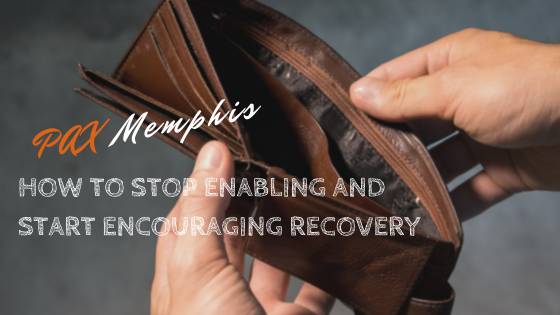If you personally love someone who is an addict, it’s important to know how to encourage recovery and how to stop enabling them. More than 31 million people worldwide suffer from a substance use disorder, so even more loved ones are placed in the chaotic and painful path of their family member’s addiction.[1] Unfortunately, addicts can be manipulative as they strive to get drugs or alcohol by any measures. It’s scary to sit by and watch the actions of someone with addiction As a result, friends and family members may start enabling their loved ones rather than encouraging sobriety. In many cases, enablers don’t even realize they are enabling. Instead, they believe they are helping keep their addicted loved one safe. It’s a natural human instinct to protect those we love, but when it comes to addiction, enabling isn’t healthy.
What is Enabling?
Enabling involves doing things for someone else that they are fully capable of doing themselves. Usually, these actions shield individuals from experiencing the brunt of their consequences related to substance abuse and subsequent behaviors. While the idea sounds straight forward, it’s not always easy to differentiate between helping and enabling. After all, it’s natural for parents to try to protect their children and for spouses to have each others backs. However, when one person’s actions begin prolonging and supporting continued drug or alcohol use, it’s important to know how to stop enabling someone.
Enabling also involves overlooking negative behaviors, completing tasks and obligations for a loved one, and making excuses to defend someone. It’s no surprise that these behaviors permit individuals to keep using drugs and alcohol. Sadly, it’s not always easy to stop enabling someone you love and care about.[2]
Examples of enabling behaviors include:
- Keeping secrets for a loved one in order to protect them
- Making excuses for a loved one missing work, school, or falling short on any obligations
- Blaming others for someone else’s behaviors
- Blaming another condition or circumstance for a loved one’s addiction (mental illness, childhood trauma)
- Avoiding a loved one and ignoring their behaviors
- Providing money, clothing, or shelter to an addicted loved one
- Caretaking behaviors
Drug and alcohol addiction have severe and dangerous consequences and enabling doesn’t make things any better. When you enable an addict, you block them from experiencing the impacts they need to feel in order to get help. Furthermore, enabling cultivates unhealthy family roles and dynamics comprised of resentment, anger, and fear. Consequently, if you have a loved one who suffers from addiction, it’s vital to learn how to stop enabling them.
Tips to Help you Stop Enabling Someone
Once you understand that enabling your loved one will only make things worse, you can begin to identify exactly what behaviors you act out on that are prolonging substance use. This isn’t always easy to do on your own, so don’t feel hesitant to reach out for help. If you like the idea of a support group, find an Al-Anon meeting near you.[3] These groups are for friends and family of alcoholics who come together to help one another. Many of their meetings address enabling behaviors. On the other hand, participating in counseling and therapy can help you stop your enabling behaviors. Some ideas for how to stop enabling someone you love include:
- Don’t lend money
- Refuse to provide shelter if they are under the influence
- Don’t bail them out of jail, pay legal fines, or other bills
- Never supply them with drugs or alcohol
Another important thing to do when trying to stop enabling someone is to set firm and healthy boundaries. When setting a boundary, let your loved one know exactly which behaviors will no longer be tolerated are and what the repercussions will be if he or she doesn’t respect the boundary. If you struggle to do this on your own, support groups or a trusted therapist can help.
Lastly, it’s important to make time to take care of yourself. Addiction adds a lot of unwanted stress and anxiety to everyone’s life, so it’s vital to make sure you are eating healthy, getting enough sleep, taking time to relax by yourself, and doing things that bring you joy. Don’t neglect your own responsibilities because of your addicted loved one. As the saying goes, “you can’t help someone else if you can’t help yourself.”
How to Encourage Recovery
When someone you love is abusing drugs or alcohol and begins suffering, it may be difficult to admit the weight of the problem. This leads to denial – something that is common for both addicts and their loved ones. As a result, enabling behaviors begin out of love. Similarly, they also end out of love. When you stop enabling someone, you allow them to recognize how much things have gotten out of control. In the end, this helps convince a loved one to go to rehab.
If setting firm boundaries and letting go of enabling behaviors isn’t enough, you may want to consider staging an intervention. Addiction interventions are led by a professional interventionist who guides the family in making their loved one agree to seek help. However, in many cases, when you stop enabling someone and let them face their own consequences, the pain becomes enough to push them to ask for help.
When your loved one is ready, contact a trusted addiction specialist near you. Many comprehensive drug rehab programs offer not only individual treatment, but family therapy as well. This allows you, your loved one, and your entire family to heal from addiction and learn to support each other in recovery.
References:
Medically Reviewed: September 25, 2019

All of the information on this page has been reviewed and verified by a certified addiction professional.










